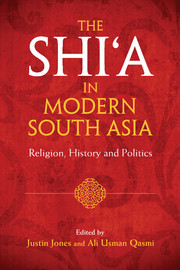Book contents
- Frontmatter
- Contents
- Preface
- Introduction
- 1 Faith Deployed for a New Shiʿi Polity in India
- 2 The Ismaʿili – Isna ʿAshari Divide Among the Khojas
- 3 Local Nodes of a Transnational Network
- 4 Shiʿism, Humanity and Revolution in Twentieth-century India
- 5 Universalising Aspirations
- 6 Muslims, Media and Mobility in the Indian Ocean Region
- 7 Shariʿa, Shiʿas and Chishtiya Revivalism
- 8 Third Wave Shiʿism
- Contributors
- Index
2 - The Ismaʿili – Isna ʿAshari Divide Among the Khojas
Published online by Cambridge University Press: 05 May 2015
- Frontmatter
- Contents
- Preface
- Introduction
- 1 Faith Deployed for a New Shiʿi Polity in India
- 2 The Ismaʿili – Isna ʿAshari Divide Among the Khojas
- 3 Local Nodes of a Transnational Network
- 4 Shiʿism, Humanity and Revolution in Twentieth-century India
- 5 Universalising Aspirations
- 6 Muslims, Media and Mobility in the Indian Ocean Region
- 7 Shariʿa, Shiʿas and Chishtiya Revivalism
- 8 Third Wave Shiʿism
- Contributors
- Index
Summary
The impact of British colonialism on the society of Bombay has been addressed by many scholars. Recently, Nile Green has explored the city's Muslim communities to show how religious leaders were prominent among those who profited from the modernisation implemented by the British. However Karachi, despite its status as Bombay's twin city in terms of close political links and parallel economic growth in the nineteenth century, has received much less academic attention than Bombay. Nevertheless, the two cities share important similarities, as well as disparities. In both cases, their economy was controlled by a number of castes: Parsi, Hindu as well as Muslim. These merchant groups, as the vanguard of economic growth, were among the first to deal with the major changes associated with colonial-era transformation.
This article addresses the evolution of one of these groups, the Khojas, at the turn of the twentieth century. It examines the extent to which the challenges introduced by British colonial rule compelled the Khojas, a community resident in both Bombay and Karachi, to reshape their social and religious structures. The Khojas comprised a cluster of castes, mainly established in Sindh and Gujarat, which were dominated by trader groups. In each locality, the main families of the community were represented on a panchayat (working council), issuing rules and regulations on community matters. Nevertheless, Khoja castes were rather open, since as a community they could incorporate low castes, and even outcastes, in cases where these could reinforce their economic network. However, Khojas consisted of atomised small communities independent from one another. It is certainly quite difficult to link them to a systematic, institutionalised religion. Instead, as was quite common in north-west India, Khojas could be the followers of a number of different pirs and gurus, both Muslim and Hindu. Among their religious guides were Muslim pirs who were the deputies of the Ismaʿili leader of Iranian origin, Hasan ʿAli Shah (1800–1881), later known as Aga Khan I.
- Type
- Chapter
- Information
- The Shi‘a in Modern South AsiaReligion, History and Politics, pp. 36 - 56Publisher: Cambridge University PressPrint publication year: 2015



